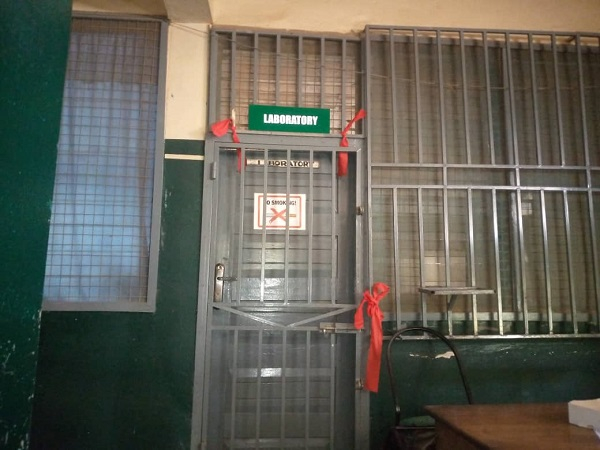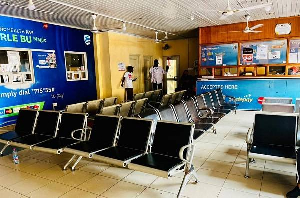The nationwide strike by the Medical Laboratory Workers Union has left many patients stranded at health facilities across the country.
A visit to some medical facilities revealed virtually empty laboratory centres.
At the Kaneshie Polyclinic the acting Director of Medical Services, Dr Jacob Adjei Larbi, told the Ghanaian Times that the facility had received notice of the strike and had to refer patients who needed laboratory services to private facilities and would continue to take that step until the strike is called off.
The only challenge confronting the polyclinic he explained was the issue of expectant mothers and others who would need blood transfusion, especially emergency cases which they would refer to the 37 Military Hospital while others with severe conditions would be given emergency iron supplements to stabilise them prior to their referral.
At the Mamprobi Polyclinic and the Korle-Bu Teaching Hospital, the story was no different as the laboratory doors were locked with empty seats and a red band tied at the entrance with staff not ready to comment on the issue.
Kingsley E. Hope reports from the Ashanti Regional capital, Kumasi that private laboratory facilities were “cashing in” due to the ongoing strike by the Medical Laboratory Professional Workers Union (MELPWU) as patients are forced to pay higher fees for services.
A visit to the Adum Clinic in Kumasi saw a lot of patients flocking there for laboratory services.
A similar surge in clients was also witnessed at Ellolab Service Centre.
Ebenezer Wireko, the General Manager of Ellolab, noted that the strike had presented an opportunity for his and other private lab facilities to generate revenue, emphasising that the charges at Ellolab were moderate.
Clement Adzei Boye reports from Takoradi that patients who visited the Effia Nkwanta Regional Hospital had to access nearby private laboratory services for clinical investigations and present results to doctors, for further diagnosis.
“We have put in place a mechanism with other medical laboratories nearby so that when the need arises, we fall on them so that, we save lives and also don’t overburden our patients,” an official of the hospital told the Ghanaian Times.
Samuel Agbewode reports from the Volta Regional capital Ho, that patients expressed worry about the ongoing strike action embarked on by the medical laboratory technicians, which was affecting healthcare delivery in the municipality.
According to them, laboratory tests on patients were carried out outside the government health facilities, which cost them greatly as the cost was three times at private health facilities, as compared to the normal fees charged at the government health facilities.
A caretaker of a patient at the Ho Municipal Hospital, Mrs Veronica Atitsogbui, lamented that a laboratory test was supposed to be carried out on a patient on oxygen in the facility but as a result of the strike, the family had to spend an extra amount of GH¢700 for an ambulance to carry the patient to a private health facility outside the Volta Region.
Mrs Atitsogbui said many of the patients who could not afford an extra cost to carry out laboratory tests outside the government facilities were left and prayed that the strike should end soon.
The Medical Superintendent at the Jasikan Municipal Hospital in the Oti Region, Dr Fidelis Attiah, appealed to the striking laboratory technicians “to temper justice with mercy” and return to work while their leaders continue to negotiate with the government.

The Jasikan Government Hospital Medical Laboratory under lock
Rafia Abdul Razak reports from Wa in the Upper West Region that patients were being forced to seek laboratory services outside the hospital with some unable to afford the charges of private laboratories.
A 65-year-old woman, Amamata Sugsuma, whose daughter was undergoing a post-delivery treatment said they were stranded since they could not access lab services in the hospital and the private labs were very expensive
“We have spent about GH¢ 500 this morning for only one lab test, I know if we were to do the lab in the municipal hospital the cost involved would have been less as compared to the private, we have spent all our monies on the lab test,” she lamented.
General News of Friday, 21 June 2024
Source: ghanaiantimes.com.gh
Healthcare delivery challenge: Patients stranded at hospitals nationwide as laboratory technicians lay down tools
Entertainment
















